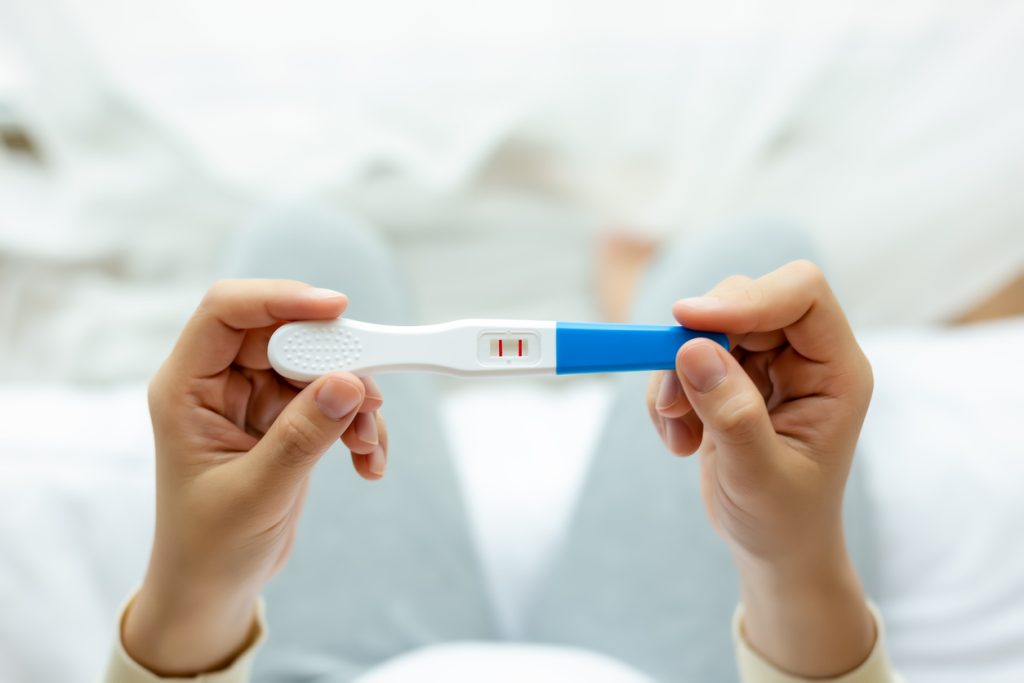Polycystic Ovary Syndrome (PCOS) is a common hormonal disorder that affects 8 to 13 percent of women of reproductive age. But around 70 percent are undiagnosed around the world. The disorder is characterized by prolonged or infrequent menstrual periods and higher androgen (male hormones) levels than normal.
Women with PCOS may experience a variety of symptoms, such as weight gain, fatigue, unwanted hair growth, infertility, and bloating. One of the key physical manifestations of PCOS is the presence of polycystic ovaries, where the ovaries may be enlarged and contain numerous small fluid-filled sacs (follicles) surrounding the eggs. Detecting pregnancy in women with PCOS can be challenging due to irregular menstrual cycles, but it is possible with careful monitoring and professional medical advice.
Relevance of PCOS and Pregnancy
PCOS has profound implications for a woman’s reproductive health and fertility . The hormonal imbalances associated with PCOS often lead to inconsistent ovulation and irregular menstrual cycles, which can complicate efforts to conceive. Moreover, even after a successful conception, women with PCOS are at an increased risk for complications such as miscarriage, gestational diabetes, and preeclampsia. Therefore, understanding how to detect pregnancy with PCOS is paramount for these women. It facilitates early pregnancy detection, allowing timely prenatal care and better managing potential health risks.
PCOS and Pregnancy

PCOS impacts fertility primarily through its effect on ovulation . Normally, an egg matures within a follicle in the ovary and is released to travel down the fallopian tube, where it can be fertilized. In women with PCOS, the hormonal imbalance can prevent the egg from fully maturing or the follicle from breaking open to release the egg, a process known as ovulation.
PCOS often leads to anovulation, causing a lack of ovulation. Insufficient progesterone production may result in water retention and PCOS bloating . Menstruation can be irregular or absent, making predicting the fertile window when conception is possible difficult.
In addition to ovulation irregularities, women with PCOS are more likely to experience insulin resistance, leading to weight gain and further hormonal imbalances, thus exacerbating fertility challenges. Lastly, the syndrome is associated with an increased risk of miscarriage, likely due to the elevated levels of luteinizing hormone and insulin in PCOS.
Therefore, while PCOS can complicate conception, it does not make it impossible. Many women with PCOS have been able to conceive naturally or with the help of fertility treatments like clomiphene citrate or metformin, which are prescribed to stimulate ovulation. It’s essential to consult with a healthcare professional for comprehensive guidance and personalized treatment options.
Importance of Preconception Care for PCOS Patients
Preconception care is pivotal in optimizing health outcomes for both mother and baby, which becomes particularly crucial for women with PCOS. Given the unique challenges posed by PCOS, early planning and proactive management strategies can significantly enhance fertility and reduce pregnancy-related complications.
Preconception care for PCOS patients typically involves regular health check-ups and monitoring of hormonal levels to ensure that any imbalances are promptly addressed. Weight management, through a balanced diet and regular physical activity, is also essential to preconception care, especially given the link between PCOS and insulin resistance.
Furthermore, women with PCOS are often recommended to take folic acid supplements to reduce the risk of neural tube defects in the baby. Finally, lifestyle modifications such as stress management techniques and cessation of smoking or alcohol can also contribute to improved fertility and healthier pregnancies. Always remember that professional consultation with a healthcare provider is essential to tailor a preconception care plan that fits your unique needs and circumstances.
How To Detect Pregnancy With PCOS

Detecting pregnancy in women with PCOS can be complex due to several factors. The main challenge arises from the irregular menstrual cycles typical of the condition. Most women rely on a missed period as the first sign of pregnancy, but this clue may not be helpful for women with PCOS who often experience irregular or absent periods.
Another obstacle to early pregnancy detection in PCOS patients is the presence of certain symptoms that mimic pregnancy. For instance, bloating, weight gain, and breast tenderness are common in early pregnancy and PCOS, making it difficult for a woman to determine if these symptoms indicate a hormonal fluctuation or the beginning of a pregnancy.
Additionally, the hormonal imbalance associated with PCOS can lead to an increased likelihood of miscarriages, further complicating the detection of a viable pregnancy. The elevated levels of luteinizing hormone and insulin in PCOS can interfere with early embryonic development. Hence, even if conception occurs, the pregnancy may not be sustained long enough to be detected by a home pregnancy test.
In light of these challenges, it is advisable for women with PCOS trying to conceive to closely monitor for signs of pregnancy, which may be subtle due to the complexities of the condition. Regular consultation with a healthcare professional can provide further clarity and guide appropriate next steps for confirming a potential pregnancy.
Methods of Pregnancy Detection for Women with PCOS
Here are some ways of pregnancy detection for women with PCOS.
-
Home Pregnancy Tests
Home pregnancy tests are the most accessible and commonly used method to detect pregnancy. These tests work by detecting the presence of human chorionic gonadotropin (hCG), a hormone produced by the placenta after embryo implantation into the uterine wall. However, it’s essential to note that while home pregnancy tests are usually reliable, they may yield false positives or negatives, especially in the early stages of pregnancy or in women with PCOS due to their unique hormonal profile. Therefore, a positive home pregnancy test should always be followed with a blood test for confirmation.
-
Blood Tests

Blood tests are more sensitive and accurate than home pregnancy tests in detecting hCG. They can be used to confirm a positive home pregnancy test and detect a pregnancy as early as one week after conception. There are two types of blood tests: qualitative hCG testing simply checks to see if the hormone is present, while quantitative hCG testing measures the exact amount of hCG in the blood. This latter type can give a clear indication of the pregnancy’s progression.
-
Ultrasound Scans
Ultrasound scans are an instrumental method in confirming a pregnancy. They can provide visual evidence of a pregnancy and allow healthcare professionals to monitor the development of the fetus. Ultrasounds typically detect a pregnancy about five to six weeks after the last menstrual period. In women with PCOS who have irregular menstrual cycles, an ultrasound can be vital in determining the age of the fetus and the expected due date.
Bottom Line
PCOS is a hormonal disorder affecting 8 to 13 percent of women of reproductive age, with a significant percentage going undiagnosed. The condition’s symptoms, including weight gain, fatigue, unwanted hair growth, infertility, and bloating, can make detecting pregnancy challenging. Women with PCOS struggle with inconsistent ovulation and irregular menstrual cycles, complicating conception efforts.
However, many have successfully conceived naturally or with fertility treatments. Preconception care becomes vital for women with PCOS, with regular health check-ups, weight management, dietary changes, and lifestyle modifications as essential components. Detecting pregnancy in women with PCOS is complex due to irregular menstrual cycles and symptoms that mimic early pregnancy.
Therefore, home pregnancy tests, blood tests, and ultrasound scans are recommended for accurate detection, always under the supervision of a healthcare professional.
Reference:
Polycystic ovary syndrome | Office on Women’s Health . (n.d.). https://www.womenshealth.gov/a-z-topics/polycystic-ovary-syndrome
World Health Organization: WHO & World Health Organization: WHO. (2023). Polycystic ovary syndrome. www.who.int . https://www.who.int/news-room/fact-sheets/detail/polycystic-ovary-syndrome
Sirl, B. (2023, July 4). PCOS and bloating: What to know . https://www.medicalnewstoday.com/articles/pcos-and-bloating

